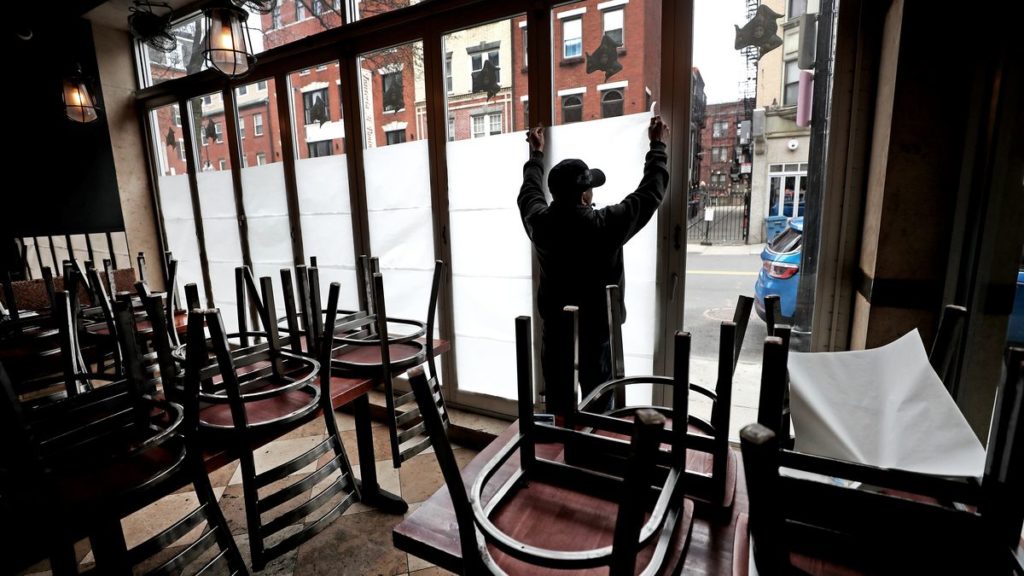
Image Source: Eater
Every week we track the business, tech and investment trends in CPG, retail, restaurants, agriculture, cooking and health, so you don’t have to. Here are some of this week’s top headlines.
On Wednesday, May 20, a new bill – dubbed the RESTAURANTS Act – will aim to infuse $120 billion in grants to small- and medium-sized restaurants that have struggled to access and make use of the Paycheck Protection Program loans. The funds would not be accessible to publicly traded companies or chains with more than 20 locations doing business under the same name.
In a survey of 240 small farmers, Dan Barber and his team at Blue Hill found that roughly 40% of them predict that they won’t be able to keep up with increasing volume. As a result, they will lose the extra, essential revenue that always comes with a bountiful seasonal harvest and end in bankruptcy.
The COVID-19 pandemic has put more than 10 million independent restaurant workers at risk of losing their jobs for good. Across sectors, businesses are being forced to pivot their business models as consumers go on lockdown and change their buying habits. This round-up features many of the ways the pandemic is impacting all parts of the food industry.
In an effort to do our part and support the community we love so dearly, we have compiled a list of resources and organizations that are providing support to those in need. We are also offering free job postings to anyone who is looking to employ people impacted by the COVID-19 pandemic.
- Resources: We have compiled a database of resources for those in the food industry impacted by the pandemic here. Please add your own resources as well.
- Jobs: We need to band together to support everyone across the food system who has lost their job due to the pandemic. Use code “coronavirusfoodjobs” to post remote or remote-friendly food jobs on our job board for free.
We need your support as well. Producing our newsletter takes a lot of time and resources, and we need to change our business model to keep it going. To date, we’ve funded our work through our events, sponsorships and consulting, which are all on hold due to the pandemic. If you find our newsletter to be a valuable resource, we hope you will consider making a one time or monthly contribution, so we can keep the newsletter going and free for those who can not afford a subscription fee. Whether it’s $5 or $500 every bit helps and shows us that you value our work. Not able to contribute right now? You can help by sharing our newsletter with friends and colleagues.
Check out our weekly round-up of last week’s top food startup, tech and innovation news below or peruse the full newsletter here.
1. New Bill Proposes $120B in Grants to Support Independent Restaurants – Eater
Unlike the PPP, this bill is tailored to small restaurants, and would infuse them with the cash needed to stay open through the rest of the year at mandated limited capacity, with very few strings attached.
2. The Small-Farmer Boom Is About to Go Bust, and Dan Barber Knows Why: The Produce Box Model Can’t Keep Up with the Summer Harvest. – The Counter
Forty percent of small farmers predict that they won’t be able to keep up with the increasing volume. Where do they expect this to end? Bankruptcy, from which many will not recover.
3. Pandemic Proof: S2G Ventures on Why Resilient, Sustainable and Healthy Food Systems are More Important Than Ever
Sanjeev Krishnan, chief investment officer and managing director at S2G Ventures, shares highlights from the fund’s new report: The Future of Food in the Age of COVID. The report explores the implications of the COVID-19 pandemic to the food and agriculture industry and identifies the areas of innovation critical to building a healthier and more sustainable food system.
4. Noma Is an Outdoor Wine and Burger Bar, for Now – Eater
Starting on May 21, René Redzepi’s award-winning Copenhagen restaurant will reopen to the public as an outdoor wine-and-burger spot — no reservations required.
5. Trump Announces $16B in Direct Payments to Farmers – The Counter
The relief package allocates $3b for food boxes as well as $16b in direct payments to farmers impacted by Covid-19. The payments will go to farmers who have suffered price declines of 5% or greater or who have incurred losses due to supply chain disruptions.
6. Purdue Food and Agriculture Vulnerability Index – Jayson Lusk
In partnership with Ranveer Chandra, Chief Scientist for Microsoft Azure Global, we’ve conceptualized the extent to which Covid-19 related illnesses pose a risk to agriculture and food production. Today, we finally have a beta version of our dashboard ready for viewing.
7. A Guide to All the Restaurant Safety Guides – Eater
With CDC guidelines coming in at a slight four pages, independent restaurant industry groups are stepping in with their own guidance.
8. Congresswoman Introduces Bill to Protect Meat Processors from Liability During Pandemic – Meat+Poultry
The legislation expands liability coverage for meat processing facilities that were mandated to reopen after Trump’s executive order in April.
9. A Seventh Amazon Employee Dies of Covid-19 As the Company Refuses to Say How Many Are Sick – The Verge
Amazon’s process for notifying workers makes the true number difficult to determine. The e-commerce giant has repeatedly declined to say how many warehouse employees have been diagnosed with or died from the virus.
10. Singapore: Olam Secures $176M Financing to Foster Digital Adoption Among Asian Smallholders – AgFunder
The loans came from International Finance Corporation and the Japan International Cooperation Agency. Olam will deploy the capital to boost the smallholder-dominated commodity crop sector across Asia and Africa.
11. Imperfect Foods Raises $72M to Expand Delivery of Ugly Produce and Pantry Goods – The Spoon
The round was led by Insight Partners. With its new funds, Imperfect will continue to bring its grocery delivery to more areas across the country and add on to its fulfillment centers.
12. Grubhub Rebuffs Uber’s Latest Offer As Merger Talks Continue – Wall Street Journal
Uber’s offer of 1.9 shares per Grubhub share was deemed insufficient.
13. Albertsons Sells Minority Stake to Private Equity Firm for $1.75B – Grocery Dive
Albertsons has sold 17.5% of its stock to private equity firm Apollo Global Management for $1.75b, bringing the grocer a cash infusion as it prepares to go public.
14. Home Chef Confirms Breach After 8M User Records Found on the Dark Web – TechCrunch
Customer names, email addresses and phone numbers were taken in the breach, along with scrambled passwords. The hackers also took the last four digits of its customers’ credit card numbers and mailing addresses.
15. Autonomous Retail Startup Standard Cognition Acquires Competitor Checkout Technologies – TechCrunch
The startup has acquired a competitor based in Italy called Checkout Technologies for an undisclosed sum, bringing its talent, tech and partnerships to Standard Cognition.
16. Clear Labs Raises $18M to Expand Its Automated Food Safety Platform to Covid-19 Testing – VentureBeat
Investors included Alphabet’s GV, Redmile Group, Menlo Ventures and Khosla Ventures. Funding will be used to commercialize its product and reappropriate its technology for the clinical market – particularly for Covid-19 diagnostic tests.
17. House Votes to Double Coronavirus Payments to Agriculture – The Fern
The bill also calls for a temporary 15% increase in SNAP benefits and allots more than $4b for other nutrition programs. It would waive work requirements for SNAP recipients and block the USDA from narrowing eligibility for food stamps.
Our newsletter is the absolute easiest way to stay on top of the emerging sector, so sign up for it today and never miss the latest food tech and innovation news and trends, Already signed up? Share the love with your friends and colleagues!
Related Posts
 Trump Taps Big Chains and Fine Dining Chefs for COVID-19 Economic Council, 200K+ Citizens Enlist to Help French Farmers + More
Trump Taps Big Chains and Fine Dining Chefs for COVID-19 Economic Council, 200K+ Citizens Enlist to Help French Farmers + More UK to Approve Gene-Edited Crops and Livestock, US Lost 372K Restaurant Jobs in December + More
UK to Approve Gene-Edited Crops and Livestock, US Lost 372K Restaurant Jobs in December + More First Lab-Grown Chicken Approved For Sale, Biden Calls for Restaurant Grants + More
First Lab-Grown Chicken Approved For Sale, Biden Calls for Restaurant Grants + More


